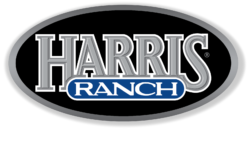Naturally occurring hormones, such as estrogen, and other growth promotants are commonly given in small doses to cattle to promote growth of muscle and reduce fat deposits.
Proven safe by scientists all over the world, including the World Health Organization/ Food and Agriculture Organization (WHO/FAO), these hormones have been in use in conventional livestock production for more than 50 years.
Harris Ranch does not always know whether a growth promotant was administered at the ranch where the cattle were raised. Therefore, we do not make a “no hormone” claim. However, at the point of consumption there is virtually no difference in the hormonal content of beef from implanted versus non-implanted cattle.
Millions of women routinely take birth control pills with no verified increase in cancer risk. Those same women would have to eat 18,431 servings of 3 oz. of beef from implanted cattle to ingest the same amount of estrogen from one pill.
Estrogen Statistics
The human body naturally produces estrogen at levels that far exceed levels found in many foods we consume daily, including beef.
Nanograms of estrogen produced daily by humans:
Adult Male – 136,000.0 ng
Non-pregnant Female – 480,000.0 ng
Pregnant Female – 20,000,000.0 ng
Many foods we eat regularly contain much more estrogen than beef.
Nanograms of estrogen present in food products:
Non-implanted Steer – 1.3 ng
Implanted Steer – 1.9 ng
Milk – 11.0 ng
Potatoes – 225.0 ng
Peas – 340.0 ng
Ice Cream – 520.0 ng
Cabbage – 2,000.0 ng
Wheat Germ – 3,400.0 ng
Soybean Oil – 1,680,000.0 ng
Nanogram (ng) = one billionth of a gram
Sources: Food and Drug Administration; Homan and Evers; Scanga et al.; FSIS-USDA; Dr. Harlan Ritchie, Michigan State University; NCBA
Closely monitored and regulated, hormone use in beef production is part of a broader commitment to sustainable agricultural practices.
With hormone use, more beef can be produced from fewer cattle, which reduces the land required to produce a pound of beef by 67%.
Relax and enjoy your favorite cut of Harris Ranch beef without concern of ingesting excessive amounts of hormones. Our beef is a nutrient-dense food that’s as pure and great tasting as nature intended.
